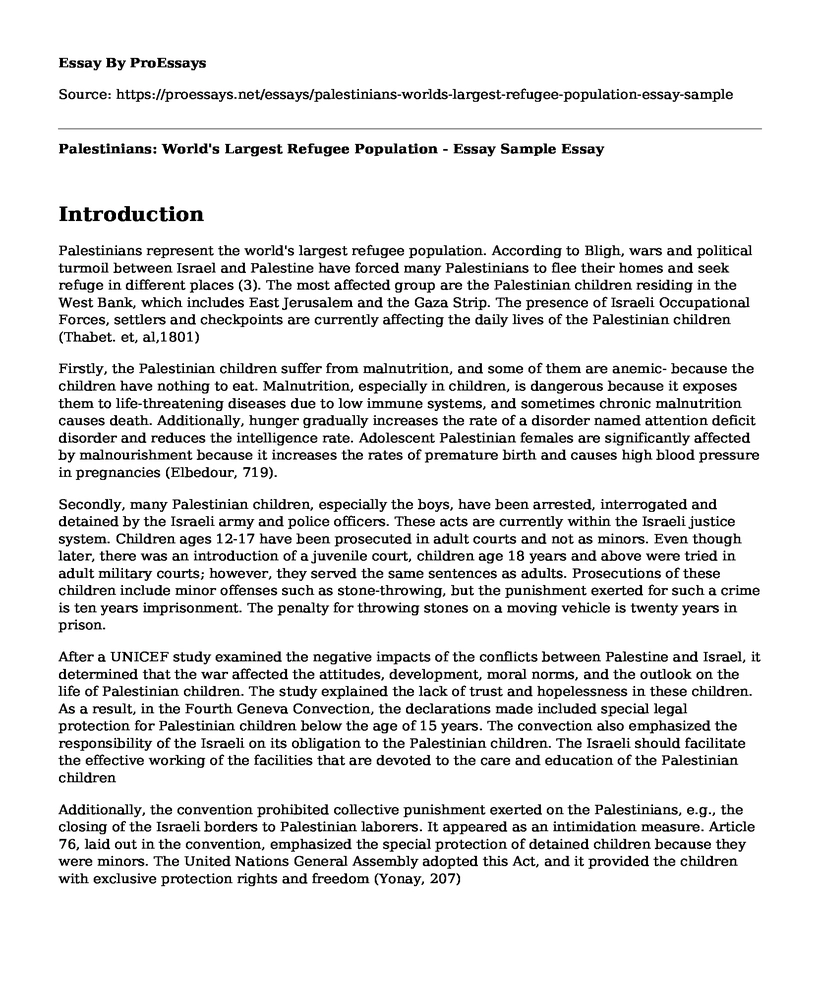Introduction
Palestinians represent the world's largest refugee population. According to Bligh, wars and political turmoil between Israel and Palestine have forced many Palestinians to flee their homes and seek refuge in different places (3). The most affected group are the Palestinian children residing in the West Bank, which includes East Jerusalem and the Gaza Strip. The presence of Israeli Occupational Forces, settlers and checkpoints are currently affecting the daily lives of the Palestinian children (Thabet. et, al,1801)
Firstly, the Palestinian children suffer from malnutrition, and some of them are anemic- because the children have nothing to eat. Malnutrition, especially in children, is dangerous because it exposes them to life-threatening diseases due to low immune systems, and sometimes chronic malnutrition causes death. Additionally, hunger gradually increases the rate of a disorder named attention deficit disorder and reduces the intelligence rate. Adolescent Palestinian females are significantly affected by malnourishment because it increases the rates of premature birth and causes high blood pressure in pregnancies (Elbedour, 719).
Secondly, many Palestinian children, especially the boys, have been arrested, interrogated and detained by the Israeli army and police officers. These acts are currently within the Israeli justice system. Children ages 12-17 have been prosecuted in adult courts and not as minors. Even though later, there was an introduction of a juvenile court, children age 18 years and above were tried in adult military courts; however, they served the same sentences as adults. Prosecutions of these children include minor offenses such as stone-throwing, but the punishment exerted for such a crime is ten years imprisonment. The penalty for throwing stones on a moving vehicle is twenty years in prison.
After a UNICEF study examined the negative impacts of the conflicts between Palestine and Israel, it determined that the war affected the attitudes, development, moral norms, and the outlook on the life of Palestinian children. The study explained the lack of trust and hopelessness in these children. As a result, in the Fourth Geneva Convection, the declarations made included special legal protection for Palestinian children below the age of 15 years. The convection also emphasized the responsibility of the Israeli on its obligation to the Palestinian children. The Israeli should facilitate the effective working of the facilities that are devoted to the care and education of the Palestinian children
Additionally, the convention prohibited collective punishment exerted on the Palestinians, e.g., the closing of the Israeli borders to Palestinian laborers. It appeared as an intimidation measure. Article 76, laid out in the convention, emphasized the special protection of detained children because they were minors. The United Nations General Assembly adopted this Act, and it provided the children with exclusive protection rights and freedom (Yonay, 207)
Conclusion
In summary, these declarations made by the United Nationals emphasized the role of the Israeli in protecting Palestinian children because it is common for children to be caught up between wars. Palestinian children deserve better living conditions, and therefore, the Israeli government should improve on their governing techniques and extend a kind gesture to the Palestinian children.
References
Bligh, Alexander, ed. The Israeli Palestinians: an Arab minority in the Jewish state. No. 27. Psychology Press, 2003.
Elbedour, Salman, et al. "Post-traumatic stress disorder, depression, and anxiety among Gaza Strip adolescents in the wake of the second Uprising (Intifada)." Child Abuse & Neglect 31.7 (2007): 719-729.
Khamis, Vivian. "Post-traumatic stress disorder among school age Palestinian children." Child abuse & neglect 29.1 (2005): 81-95
Thabet, Abdel Aziz Mousa, Yehia Abed, and Panos Vostanis. "Emotional problems in Palestinian children living in a war zone: a cross-sectional study." The Lancet 359.9320 (2002): 1801-1804.
Yonay, Yuval P., and Vered Kraus. "Strategies of economic endurance: Israeli Palestinians in the ethnic economy and the public sector." Research in Social Stratification and Mobility 18.3 (2001): 207-247.
Cite this page
Palestinians: World's Largest Refugee Population - Essay Sample. (2023, Apr 19). Retrieved from https://proessays.net/essays/palestinians-worlds-largest-refugee-population-essay-sample
If you are the original author of this essay and no longer wish to have it published on the ProEssays website, please click below to request its removal:
- Gender and Income Correlation: Chi-Square Distribution
- Essay on Native People Living in the US
- The Surge of Nationalism: Race, Nationalism, and War Essay Example
- 60 Troops Killed in Houthi Missile Attack in Yemen - Essay Sample
- Essay Example on Feminist Analysis of Gender Concepts: Examining the Concept of a Man
- Essay Sample on Social Security Act of 1935: A Federal Policy Change for the Elderly
- Performance-Enhancing Drugs in Sports: Balancing Risks, Fairness, and Health - Free Paper







